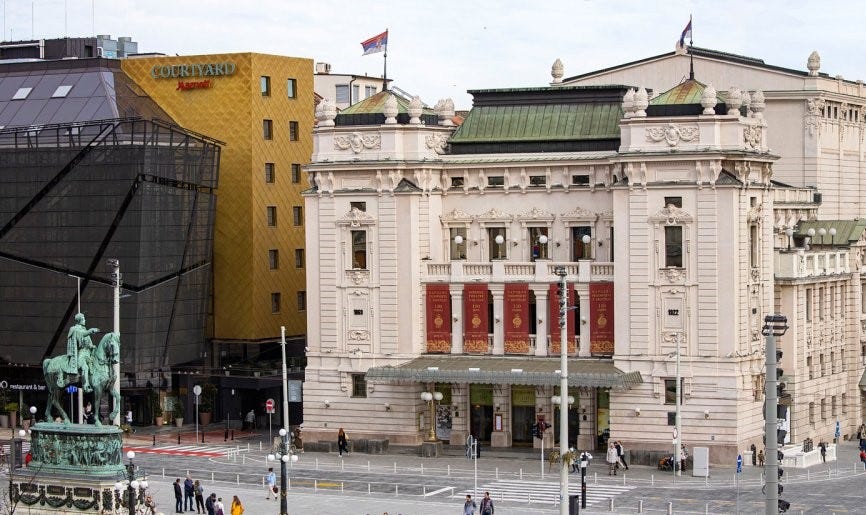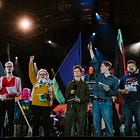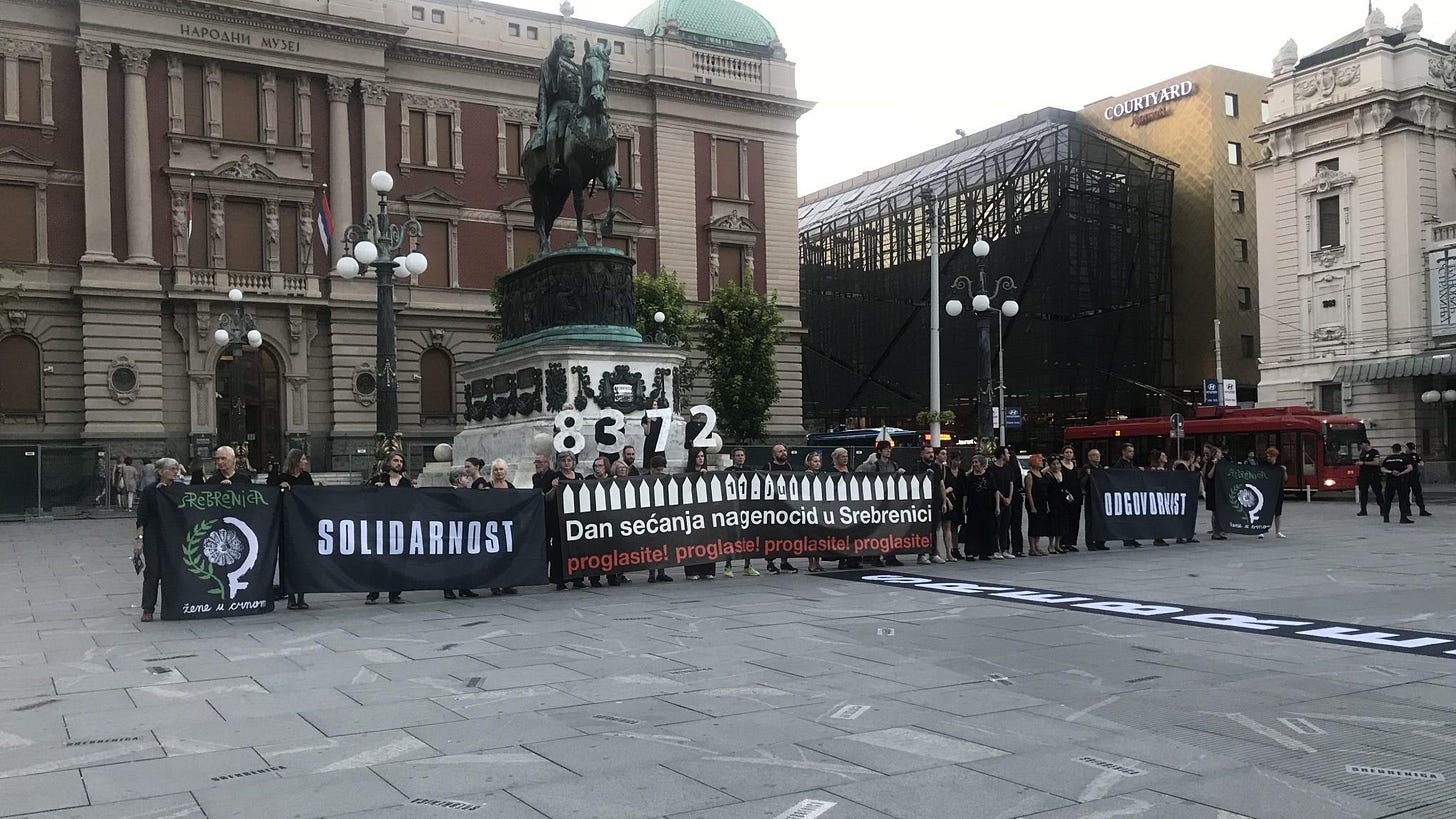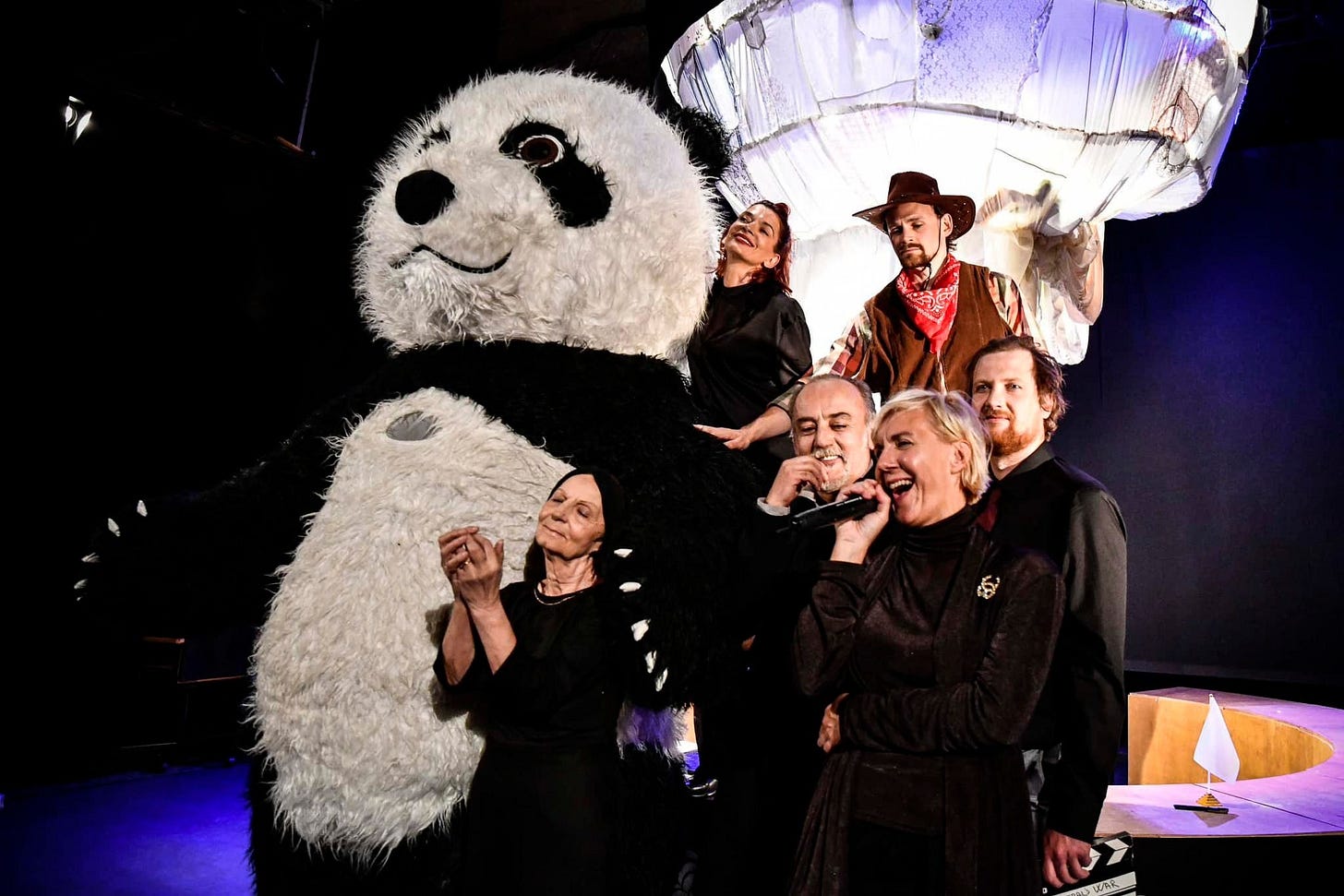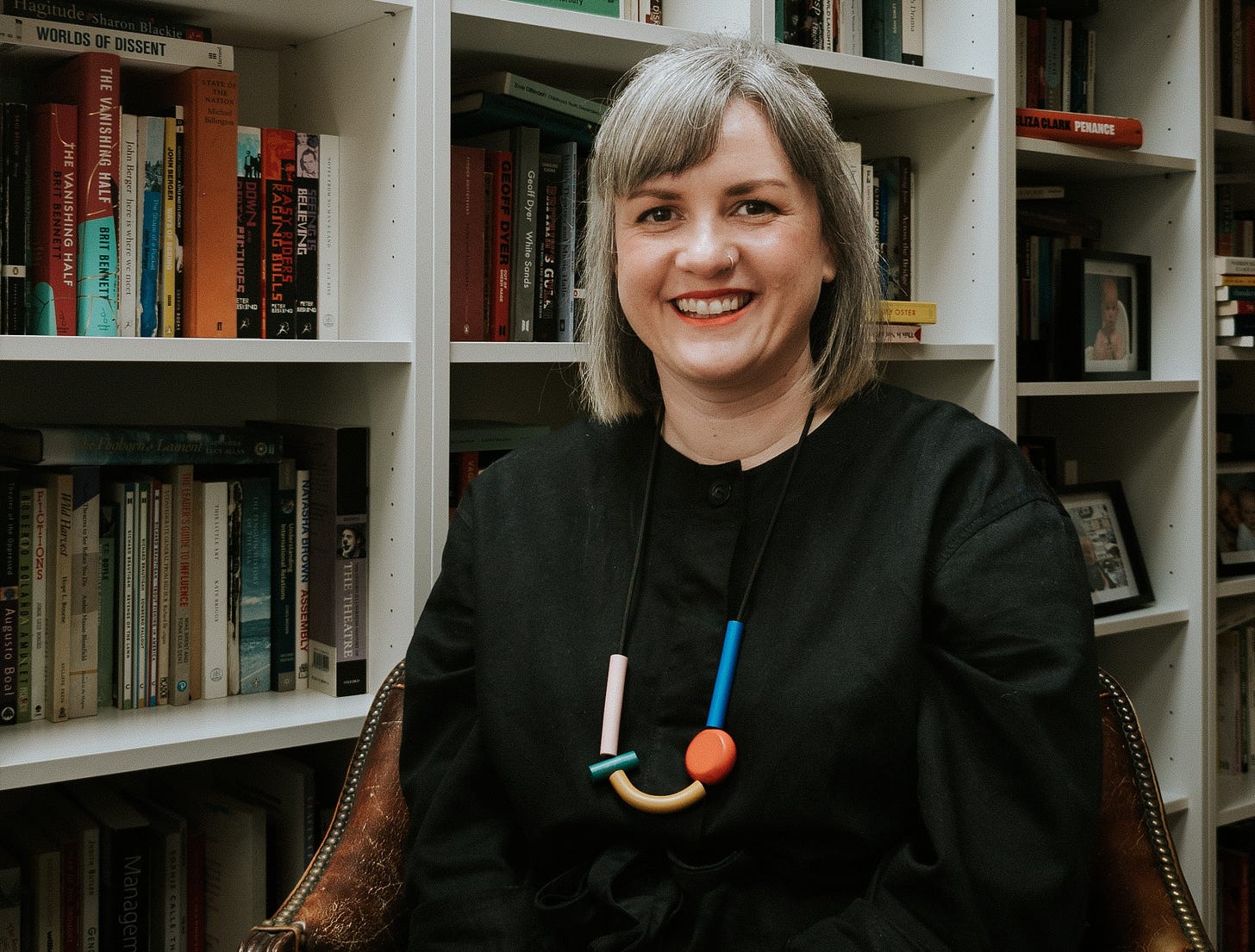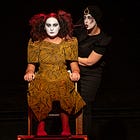Provocation by press release: The Kosovo Theatre Week that never was
On playwright Jeton Neziraj's latest 'intervention' and a new book about the power of art to create change.
This week I’m still in Belgrade, where the temperature is still in the high 30s with no sign of dropping anytime soon. Everything takes more effort in this heat. It’s energy-sapping and oppressive, though I’m fortunate to be able to have places near my air-con-free apartment to retreat from the heat. I wouldn’t want to be a delivery rider or a grill cook in this weather.
In keeping with last week’s newsletter, in which I spoke to Milo Rau about his plans to overhaul the Wiener Festwochen, this week is also about the relationship between art and activism. Recently I spoke to the British writer Amber Massie-Blomfield about her fascinating new book Acts of Resistance: The Power of Art to Create a Better World. But first a story from the Balkans on a not-unrelated theme.
Here comes the tedious transactional bit: Café Europa is free and, for now, I’m keen to keep it that way, but if you’d like to help sustain it, support my writing (and receive the occasional bonus edition - like this one on Carolina Bianchi’s The Bride and the Goodnight Cinderella), there’s the option to become a paid supporter.
On 10th July, the evening before the 29th anniversary of the Srebrenica genocide, members of the feminist peace campaign group Women in Black gathered in Belgrade’s Republic Square. Standing in silence, they held up banners saying declaring “Never Forget” and “Solidarity“, as well as the number 8,372, the number of known victims of the massacre.
They also called upon the Serbian government to: “Proclaim July 11 Srebrenica Genocide Remembrance Day”, something it has resisted. Stickers with the word Srebrenica covered the square. (These would be gone the following morning, unlike the large piece of ugly, nationalist graffiti on a nearby building declaring in foot-high letters in English ‘The only genocide in the Balkans was against the Serbs’ – that’s still there).
The Women in Black have been engaged in non- violent resistance since 1991, from the beginning of the war in Yugoslavia. Over more than three decades they have organized around 2,500 street actions. They protested the war in Gaza and Ukraine as well as making an annual gestures of solidarity and memorial for those killed in Srebrenica. Clad in black, they form a striking tableau. While the blowing of whistles and the banging of pots and pans is part and parcel of protest in the region, there’s something unarguably powerful about their silent gesture.
Creative forms of protest and resistance are prevalent in the region. Humour and music were central to the anti-Milošević Otpor movement in the 1990s, for example (there’s a very detailed exploration of their methods here). But resistance can take many shapes. It can even come in the form of a press release.
Earlier this year, the Mirëdita, Dobar Dan festival, which since 2014 had been connecting artists, activists and audiences in Serbia and Kosovo, (‘mirëdita’ and ‘dobar dan’ mean ‘hello’ in Albanian and Serbian respectively) was cancelled by the Serbian authorities. Though the festival had always gone ahead safely and successfully despite the efforts of protestors, this year the festival was deemed a potential security risk and prevented from going ahead. You can read more about the cancellation and its consequences in this excellent piece on SEEstage.
Several days later, on 2nd July, Kosovo-based theatre company Qendra Multimedia released a press statement announcing they had just signed a contract with the National Theatre in Belgrade to present a Kosovo Theatre Week in the Serbian capital on the Day of the Republic in November. News of this unprecedented act of cultural cooperation was picked up by multiple media outlets and shared widely on social media. If you read the statement in more detail, however, it was clear things didn’t quite stack up. In the wording one could detect the familiar, satiric tone of Qendra Multimedia’s director, the playwright Jeton Neziraj. Of course there was no Kosovo Theatre Week. The press release was a provocation.
“Using the existing discourse in Serbia, we wanted to touch a nerve in the public, by 'falsely alarming' them, about something that should be more than normal,” says Neziraj, explaining we he chose to release the statement.
The virtual space is a public space, argues Neziraj, and the media can therefore be used as a tool for exposing and revealing political and public attitudes, which the stunt did, very successfully.
“By producing this kind of provocation, we aimed to stimulate critical thinking, but above all we wanted to test the level of intolerance in the public opinion,” explains Neziraj. While some sections of the public were dismayed by the news, for another, admittedly smaller group, the announcement was a source of hope.
One of the reasons people were ready to believe it, is the fact that Qendra Multimedia has a strong track record of cultural cooperation with Serbia. They host an annual Kosovo Theatre Showcase, which usually includes at least one Serbian production and since 2010 it has hosted POLIP, an international literature festival forged with the specific goal of allowing Serbian and Kosovan writers and poets to meet up and engage with one another’s work.
Nezraj also co-produced a version of Romeo and Juliet with Serbian and Kosovan actors with the National Theatre in Belgrade back in 2015 – the Guardian wrote about it here – and an intrenatonal production of his play Balkan Bordello with actors from Serbia, Kosovo and New York’s LaMaMa Theatre, but more recently (and a tad ironically) he struggled to find anyone to host his last play Negotiating Peace in Belgrade. (It was eventually performed in Novi Sad Theatre, whose artistic director András Urbán also has a reputation as something of a provocateur and giver of zero-fucks).
Much of the media coverage and social media response in Serbia was negative. Some of it was overtly racist, says Neziraj. There was talk of the National Theatre in Belgrade being 'polluted' by Albanians, and that “for three days Belgrade will breathe Albanian.” This reflects a political climate in which Kosovo is regularly made a scapegoat and used as a distraction tactic or a way of pandering to their nationalist voter base. Regardless of the issue of the day, the Serbian President will always somehow steer the conversation back to Kosovo.
There was also, points out Neziraj, pushback in Kosovo, where the media landscape is also “politically contaminated” and where too, “there is no enthusiasm for cultural cooperation with Serbia,” though the response wasn’t quite so vehement.
Why were people so ready to believe it? Because such a collaboration, thinks Neziraj, “under normal circumstances would be the most normal thing. People wanted to believe it because it seemed possible.” There were some people who welcomed this advancement of Kosovo-Serbia cultural relations. This is encouraging, says Neziraj, because “it shows that the masses are not homogenous in vomiting nationalist bile, but that there are also reasonable voices who are fed-up with the hatred and intolerance.”
“This book has given me hope” - an interview with Amber Massie-Blomfield
“I suppose the point was to prove to myself that you know what I was doing with my life mattered,” says Amber Massie-Blomfield about what inspired her to write Acts of Resistance: The Power of Art to Create a Better World, her recently published book about the relationship between art and political resistance.
Massie-Blomfield, the former executive director of Complicité, started thinking about this project in 2018. At the time, the UK was in the process of negotiating itself out of the EU and Donald Trump was incarcerating children on the border of Mexico. Things, she says, “seemed very dystopian.” (Though obviously, with hindsight, 2018 was a walk in the park compared to where we are now). Though she’d always been a real believer in the political power of art, and her work as a producer and executive director - she previously held that role at Camden People’s Theatre in London - reflected that, she started to ask herself questions about her work if what she was doing mattered.
Initially Massie-Blomfield set out to look for stories of artworks that created real-word changes, in the law or in policy, where there was a very tangible cause and effect. There are several stories like that in the book, including the making of Blood of the Condor, a 1969 Bolivian docudrama that exposed the fact the members of the US Peace Corps were sterilizing women without their consent. The resulting public outcry was so great that the Bolivian Congress launched an inquiry, which found this to be true. The book also includes a timely reference to Mr Bates vs the Post Office, the recent British television drama which generated so much public interest in a decades-long miscarriage of justice that the government was driven to announce new legislation to exonerate wrongly convicted subpostmasters.
However, while she was researching these stories, Massie-Blomfield came to realise that art’s power as a form of resistance is more often “woven into a kind of tapestry of resistance coming from many different sources,” part of a bigger picture.
This is embodied in the chapter on the ZAD (Zone à Défendre, or “Zone to Defend”) a self-organized autonomous zone near Nantes in western France. It was initially set up as a climate camp to protest against a new airport that was going to be built there. “A lot of the sort of local, traditional farming community were being evicted from their farms to make way for this airport,” says Massie-Blomfield. Activists occupied buildings that had been left empty by the authorities and built their own yurts and shacks. A group of artists were part of that movement, she says, including Jay Jordan,” who's one of my, my great heroes,” and their partner Isabelle Fremeaux. There's a sense of creativity and art woven through the way they lived there.” They decided, she says, “to live as if the airport will never be built. And what that means is they created this community with real love and art and care.”
Returning to the Balkans, one of the chapters is devoted to the production of Waiting for Godot directed by Susan Sontag in Sarajevo, while the city was under siege.
During the siege, which would last nearly 1,500 days under siege, Bosnian director Haris Pašović - who would also found the Sarajevo Film Festival during this time in a bid to preserve the city’s artistic life and to retain a sense of humanity - invited Sontag to the city to direct a play. (Initially she suggested Beckett’s Happy Days, but Pašović felt that, given the city’s predicament, Godot was more apt). Though water, food and electricity were all scarce and there was the very real risk of death every time you stepped outside, Sontag and a group of local actors set about staging Beckett’s play. She viewed this an act of conscious, one of the few things she could do for people.
“Sontag was someone who thought so deeply throughout her life about the meaning and purpose of art,” says Massie-Blomfield, who travelled to Sarajevo to interview people who participated in the production as well as to Sontag’s archive in LA.
The book does not ignore the considerable pushback and outright hostility Sontag faced at the time. She was accused of crisis tourism. “It seemed to symbolize everything about the intellectual arrogance of the notion that art can make a difference,” says Massie-Blomfield. The idea of this woman going a city under siege, where people are going hungry and you risk of being killed was very real, to put on “a fairly esoteric, obtuse piece of modernism, people found that offensive.”
However, says Massie-Blomfield, “almost everyone that she spoke to who was in Sarajevo at the time, everyone who actually saw the production, responded incredibly positively to it. “They were very moved by the fact that Susan Sontag had taken that decision to come to Sarajevo and stand in solidarity with the people of the city.” And she formed relationships with people that lasted long after the siege. “It was particularly affecting reading that correspondence, because she really was very genuine in her relationship,” says Massie-Blomfield.
Putting on a theatre performance was important to Sontag, she says, “because it was the only art form that could only be experienced if you were there and if you understood what it meant to have risked your life to be there.” For Massie-Blomfield this encapsulates the power of theatre as a form of solidarity, “because you have to be in a room together, and you have to be experiencing the same set of circumstances to be there. It was really significant that was the art form she chose.”
Researching and writing the book has been something of a journey. It’s helped clarify her sense about art’s capacity to make an impact. “The book has given me hope about the political power of art, but perhaps not quite in the way I was expecting,
Acts of Resistance: The Power of Art to Create a Better World is available to buy from these outlets.
This week in European theatre
A round-up of festivals, premieres and other upcoming events over the next seven days.
Mittelfest – Programming a mix of theatre, music, dance and circus, Mittelfest – which takes places every year in the beautiful Italian town of Cividale del Friuli - was set up as a bridge between Italy and Central Europe. This year the programme features Jeton Neziraj’s Negotiating Peace and an audio version of The Emperor’s Tomb (which I wrote about previously here). The festival runs from 19th-28th July.
Palestinian Theatre Now – Amber Massie-Blomfield will be chairing a panel discussion with two theatremakers from Palestine: Iman Aoun, co-founder of ASHTAR Theatre (Ramallah) and Marina Barham, General Director of Al Harah Theater (Beit Jala), alongside UK-based playwright and screenwriter Hannah Khalil, as they discuss the lived realities of making theatre in Palestine and in the UK and how theatre itself can be used as a medium for dialogue and resistance. Hosted in conjunction with English PEN and Shubbak, the discussion takes place at the Royal Court on 20th July.
PrizrenFest – This open-air international festival in Prizren is a relatively new addition to Kosovo’s theatre scene but is already firmly-established in the cultural calendar. This year’s programme features work from Albania, Greece, Bosnia, North Macedonia, Italy, France and the Czech Republic and takes place in open air venues around the city. The festival runs from 21st-28th July.
Thank you for reading! You can contact me about anything newsletter-related on natasha.tripney@gmail.com


